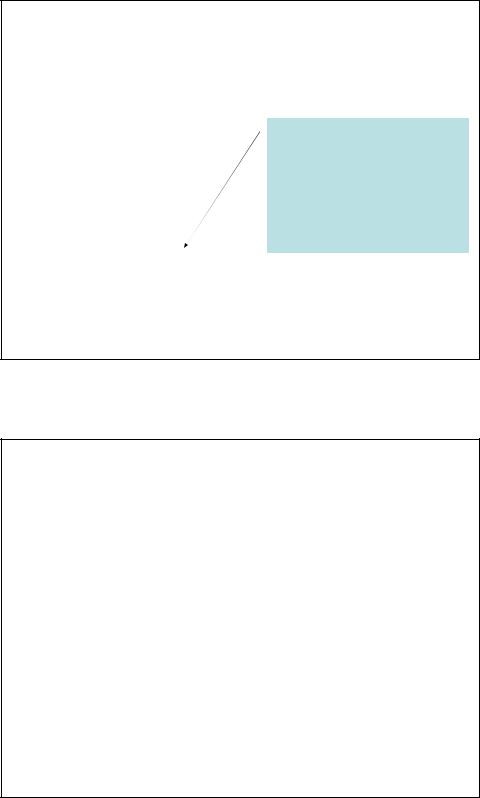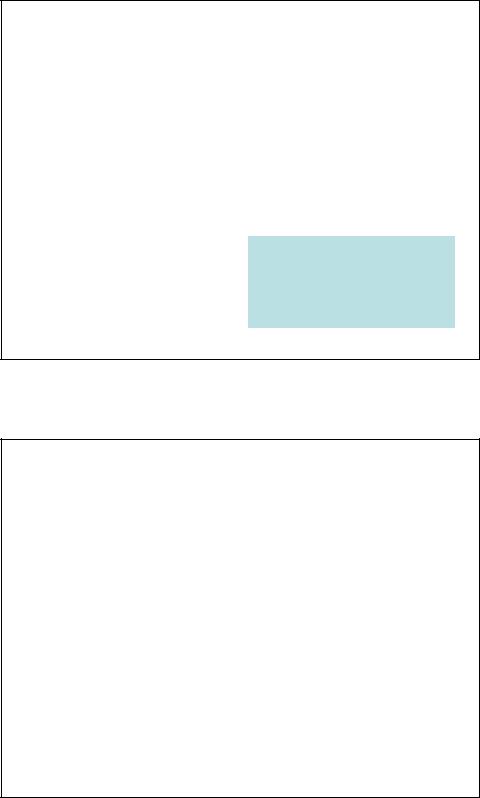
2015_лекции / SecuritySins
.pdf
19 Deadly Sins of Software
Security
M. Howard, D. LeBlanc, J. Viega
Security Defects
•We live in an age with constant threat of security breaches
–Holes in web software
–Flaws in server software
•Security defects very easy to make
–Blaster worm defect only two lines long
–One line error can be catastrophic
•Here we look at 19 common security defects (sins of security)
1

Sin 1 : Buffer Overruns
•You’ve heard this one many times/
•Occurs when a program allows input to write beyond the end of the allocated buffer
–Program might crash or allow attacker to gain control
–Still possible in languages like C#, Java since they use libraries written in C/C++ but more unlikely
Buffer Overflow Example
void DontDoThis(char *input)
{
char buf[16]; strcpy(buf, input); printf(“%s\n”, buf);
}
int main(int argc, char *argv[])
{
DontDoThis(argv[1]); return 0;
}
2

Buffer Overflow
• Here’s what caused the Morris finger worm
char buf[20]; gets(buf);
• What about this?
bool CopyStructs(InputFile *pInFile, unsigned long count)
{
unsigned long i;
m_pStructs = new Structs[count]; for (i=0; i<count; i++)
{
if (!ReadFromFile(pInFile, &(m_pStructs[i]))) break;
}
}
Buffer Overflow
• Or this?
#define MAX_BUF 256
void BadCode(char *input)
{
short len;
char buf[MAX_BUF];
len = strlen(input);
if (len < MAX_BUF) strcpy(buf, input);
}
3

Buffer Overflow
• Or this?
#define MAX_BUF 256
void BadCode(char *input)
{
short len;
char buf[MAX_BUF];
len = strlen(input);
if (len < MAX_BUF) strcpy(buf, input);
}
If a short is 2 bytes and
input > 32767, then len becomes a negative number
If input is not null-terminated/
Slightly better: Use size_t
to define size for MAX_BUF and len
Spotting Buffer Overflows
•Look for input read from the network, a file, the user interface, or the command line
•Transfer of data from input to internal structures
•Use of unsafe string handling calls
•Use of arithmetic to calculate an allocation size or remaining buffer size
4

Buffer Overrun Examples
•CVE = Common Vulnerabilities and Exposures List
•CVE-2008-0778
–Multiple stack-based buffer overflows in an ActiveX control in QTPlugin.ocx for Apple QuickTime 7.4.1 and earlier allow remote attackers to cause a denial of service (crash) and possibly execute arbitrary code via long arguments to the (1) SetBgColor, (2) SetHREF, (3) SetMovieName, (4) SetTarget, and (5) SetMatrix methods.
•CVE-2003-0352
–Buffer overflow in a DCOM interface for RPC in Windows / allows remote attackers to execute arbitrary code via a malformed message, as exploited by Blaster/MSblast/LovSAN/Nachi/Welcia worms
Buffer Overflow Redemption
•Replace dangerous string handling calls with safe ones
–C++ STL String Library considered safe
–Check loops and array accesses
–Replace static arrays with STL Containers
5

Sin 2 : Format String Problems
•A C/C++ type of problem
•First mentioned June 23, 2000
void main(int argc, char * argv[])
{
printf(argv[1]);
}
• Pretty simple, what could go wrong?
Format String
• What if the program is invoked as :
bug.exe “%x %x”
• Output something like:
12FFC0 4011E5 |
The %x specifier reads the stack |
|
4 bytes at a time and outputs them |
||
|
||
|
Leaks important info to the attacker |
|
|
|
6

Format String
• Another obscure format string: %n
unsigned int bytes; printf(“%s%n\n”, argv[1], &bytes);
printf(“Input is %d characters long.\n”, bytes);
Usage:
bug.exe “Hello“ Hello
Input is 5 characters long
The %n specifier writes
4 bytes at a time based on the length of the previous argument
Carefully crafted, allows an attacker to place own data into the stack
Examples
•CVE-2000-0573
–The lreply function in wu-ftpd 2.6.0 and earlier does not properly cleanse an untrusted format string, which allows remote attackers to execute arbitrary commands.
–“Providing *remote* root since 1994”
• CVE-2007-4708 TA07-352A
–Format string vulnerability in Address Book in Apple Mac OS X 10.4.11 allows remote attackers to execute arbitrary code via the URL handler.
7

Redemption
•printf(“%s”, user_input);
•Or filter user input for dangerous characters
Sin 3 : Integer Overflows
•When an unsigned integer gets too big for the number of bits allocated, it overflows back to 0
–For signed integers, positive numbers suddenly become negative numbers
•“Obvious” errors where integers are multiplied/added/etc. and overflow
–Result can be very bad and unpredictable behavior if relational operators suddenly behave the opposite of how they are supposed to
•Also many less obvious errors
8

Casting
•Implicit type casting is a frequent cause of integer overflows
•Most languages require the same types to be compared so an up-cast is done
const long MAX_LEN = 0x7FFF;
short len = strlen(input);
if (len < MAX_LEN)
{
// Do stuff
}
If a short is 2 bytes and
input > 32767, then len becomes a negative number
Casting
•Signed int to Larger signed int
–Smaller value is sign-extended
•0x7F to an int becomes 0x0000007F
•0x80 to an int becomes 0xFFFFFF80
•Signed int to Larger unsigned int
–Positive numbers behave as expected
–Negatives unexpected
•(char) -1 becomes 0xFFFFFFFFF or 4,294,967,295
9

Overflow Problem
•Problem here to detect whether two unsigned 16-bit numbers would overflow when added?
bool IsValidAddition(unsigned short x, unsigned short y)
{
if (x + y < x)
return false; return true;
}
Overflow Problem in C#?
•Following code throws a compiler error, how would you fix it?
byte a, b; a = 255; b = 1;
byte c = (a + b);
ERROR: Cannot implicitly convert type ‘int’ to ‘byte’
10
